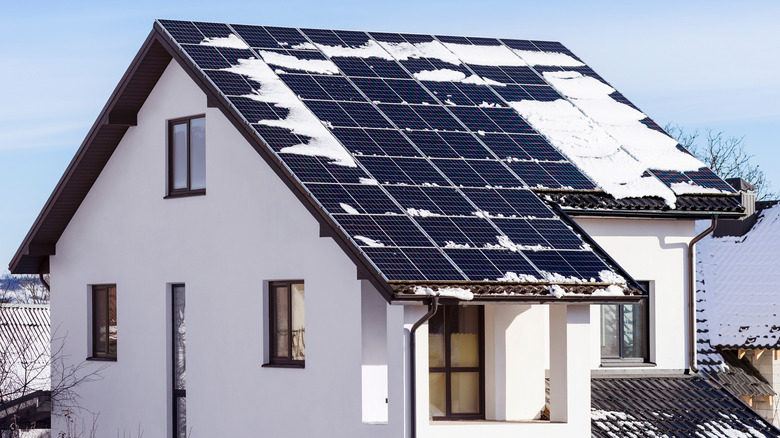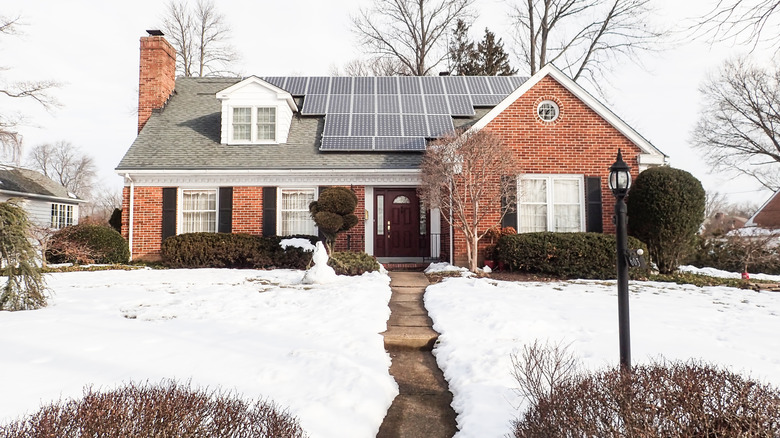How Do Solar Panels Work In The Snow?
The assumption may be that solar panels won't be as effective in the winter due to the decrease in sunlight and the snow that lands atop them. Also, let's be honest, most technology isn't known for being at its best once you start introducing extreme temperatures. However, solar panels not only defy the cold, they actually thrive in the cold.
Solar panels contain photovoltaic (PV) cells, which is what converts sunlight into electricity when it activates the electrons in the panel's silicon. The abundance of snow in the winter actually creates more usable light for solar panels because of the way the sun reflects off of ice and snow. Also, PV cells work better in the cold because lower temperatures reduce electrical resistance and increase the energy difference between resting and activated electrons, allowing for more efficient power generation.
But what about the snow covering the panels? If the snowfall is heavy enough and doesn't slide off the angle of the solar panels, it can reduce energy output. However, the actual effect is extremely minor, and snow guards can help to protect your solar panels if this is a problem you deal with frequently. Whether you are an experienced solar panel owner or are thinking about installing solar panels and want to know the ins and outs, it's important to understand how seasonal changes affect them and what you can do to ensure optimal performance for your home.
Why solar panels actually thrive in the winter
Because of the abundance of snow and ice in most locations during winter time, solar panels can actually collect more sunlight than they do during warmer months. The sun reflects off of the snow, not just brightening the area, but also bouncing back toward the panels — literally more sunlight that can be collected. When the snow slides or melts off of the panel, it also has the added benefit of cleaning the surface to help it work more optimally. This is much better performance than those driverless cars outfitted with technology that ultimately struggles in snowy conditions.
Not only that, but photovoltaic (PV) cells actually perform better in colder weather because of how temperature affects electron movement and electrical resistance. When sunlight hits the silicon in a solar panel, it energizes electrons, causing them to move and generate electricity. The amount of energy produced depends on the difference between the resting and activated states of these electrons. The greater the difference, the higher the energy output. In cold conditions, electrons at rest have less thermal energy, which increases that difference once they're activated by sunlight. Also, lower temperatures reduce the resistance in the electrical wiring, meaning less energy is lost as heat and more power is efficiently transmitted. As a result, despite shorter daylight hours, solar panels can actually operate more efficiently in winter weather than in hot conditions.
Should you remove snow atop your solar panels?
Heavy amounts of snowfall can impact the performance of solar panels, but only by a minimal amount that shouldn't be noticeable in your home's operations. The weight of the snow also cannot damage solar panels, as they are designed to withstand such pressure. If you are concerned about snowfall on your solar panels, though, there are a few things to keep in mind.
First, attempting to melt the snow isn't necessarily recommended, as that will just create a lot of icy conditions when it refreezes — a particular problem if the water freezes on your roof. And since solar panels are generally mounted on top of roofs, it's also not recommended to climb up and attempt to remove the snow yourself. The risk of slipping, falling, and injuring yourself isn't worth the effort of cleaning off the panels.
If you want a solution, you can look into installing snow guards; these will help keep your solar panels clear of snow. If you haven't installed your solar panels yet, you can talk to the installation company about adding on snow guards and having the professional do both at the same time. If you already have your solar panels up but no snow guards, you can contact your installer to have them added on after the fact without issue. The popularity of solar panels is on the rise, with new technology even creating solar panels that generate electricity in the dark. You can rest assured that no matter what winter brings, your solar panels won't fail.


